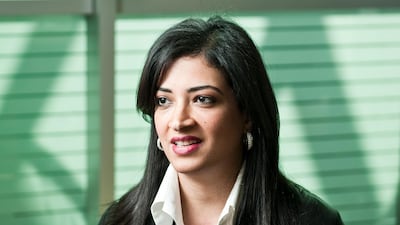The Emirati businesswoman and philanthropist, Muna Al Gurg, donated Dh1m to a neonatal intensive care unit in Jenin, a Palestinian city in the West Bank.
The support is desperately needed in the occupied territories where newborns lack adequate access to specialised care. The project is being managed by the Palestine Children’s Relief Fund, which has been working in the Palestinian territories for 25 years.
According to Unicef, around 12.5 per cent of babies born in the West Bank need neonatal specialist care. Infant mortality there is in line with the global average (around 17 deaths per 1,000) but the most common reasons for the deaths are premature birth and respiratory infection – caused from lack of access to care, including medical staff, equipment and medication.
The neonatal period, the first month of a newborn's life, is the most critical in establishing their future health.
The donation will buy new equipment for the unit in the state-run Khalil Suleiman Hospital, including 10 ventilators, beds, infusion pumps, four CPAP (continuous positive airway pressure) machines, and 10 monitors.
Dr Wisam Baker, director of the hospital, said the need for such support is dire, with 500 new deliveries every month, in addition to the 200 delivered at the private hospital.
“We have a major shortage of beds in the Nicu with only 14 at the moment,” said Dr Baker. “Most of the time, we need to transfer the newborns to other hospitals and this will be risky especially to premature babies and also costly to the families.”
One night in the NICU costs around $400 (Dh1,500) said Dr Baker, with most of the neonates needing several days to weeks of care.
“This donation will help us in providing more places, as well as decreasing the risk of transfer for both the mother and baby which will in turn decrease the morbidity and mortality rates for both.”
The donation has great personal meaning to Mrs Al Gurg.
“When my mother Soraya Ali Kazim passed away a year and a half ago, I decided that every single year I would do something in her name. So then when Steve [Sosebee, founder of PCRF] came and said they were looking to build a paedriatic ICU in Jenin, I thought this was wonderful,” she said.

It is the largest donation she has made in her mother’s name to date.
“My mother knew Steve personally and always supported him in the work he did. I remember every year he'd bring the annual report and she'd go through it diligently so the donation has a very personal meaning to it.”
Mr Sosebee was awarded Dh1 million by Sheikh Mohammed bin Rashid, Vice President and Ruler of Dubai, last year after being shortlisted as an Arab Hope Maker for his work in Palestine.
Following Mrs Al Gurg's donation, he said the UAE was a very important base for fund-raising.
“We have raised millions of dollars in the UAE over the past 25 years, which has enabled us to save the lives of thousands of children, build paediatric cancer hospitals, and even send 70 kids to Dubai for free care,” he said.
The unit, which is not yet fully equipped, is critical for the West Bank, said Mr Sosebee. The Israeli-occupied area is fragmented by military checkpoints, making movement difficult for Palestinians and meaning access to specialised care for sick neonates is crucial in saving lives.
“This unit will enable the hospital to better care for more children who otherwise would not get the care they need to live,” he said.
With a high birth rate in Palestine, roughly four children per family according to World Bank data, Mr Sosebee explained that the situation for neonatal care is particularly challenging. For years, Mr Sosebee has witnessed the strained Palestinian health sector struggling to cope with the demands of its growing population.
He said: “The health sector, especially the public health sector where the vast majority of poor people depend on health care services, is overburdened and unable to meet the basic needs or criteria for care. Jenin will be positively affected by this donation, enabling more care for more sick babies at a higher level and saving lives.”





